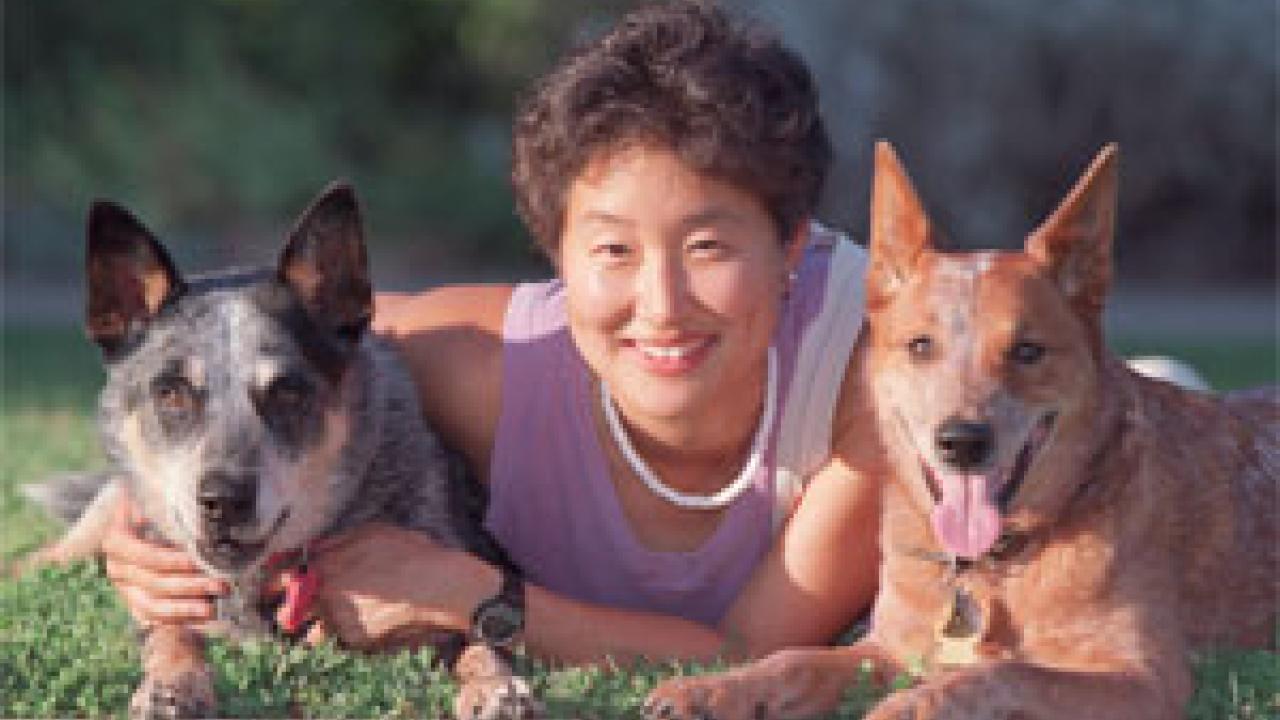Visiting Sophia Yin's West Davis home is like stepping into her research. When you ring the doorbell you will hear the scamper of paws on her polished hardwood floors, and perhaps even the thump of an excited tail slapping against the entryway wall. But never will you be greeted by a frenzied dog eager to jump, bark and paw at you.
This is because Yin, a lecturer in the UC Davis Animal Science department, has used her research in positive reinforcement to train her canine companion -- an Australian cattle dog named Zoe -- not to be unruly at the door. Instead, Zoe knows a treat will be in order if she lies down until told to get up.
Yin is an expert in the field of canine behavior, specializing in barking and canine-human communication. She graduated from the School of Veterinary Medicine in 1993 and earned a masters in animal science in 2002 while researching whether barking is a form of communication in dogs. She theorized that at least some barking is a form of communication with humans.
"Humans can learn to communicate with any animals we live with if we pay attention to what they're doing," she said. "Some domesticated animals are better at getting what they want or communicating with humans -- dogs and cats especially. The reason probably is because the ones that could communicate best are the ones people tended to help survive by feeding them or keeping them as pets."
Now Yin's research has branched off to address the most common complaints from dog owners: Excessive barking and otherwise unruly behavior when visitors ring the doorbell. Her new book, How to Behave So Your Dog Behaves, is coming out this month, and she also has worked with the Sharper Image to develop a dog training system, Treat and Train.
Yin believes traditional forms of training involving punishment are the wrong way to go about changing behavior. "For instance, if it's a fearful dog, you could make him more fearful," she said. "And because you're using force or pain in some cases, you can also cause him to become more aggressive."
The key, she says, is to train dogs into desired behaviors using positive reinforcement, such as offering treats.
Another hat Yin wears is that of animal behavior columnist for the San Francisco Chronicle. Since 1999 she has written twice a month on animal-related topics ranging from cats' digestive tracts to the recent decline of California's Coho salmon population. "I like to write about a variety of topics," Yin said. "The more species you learn about, the more it helps, even if you're concentrating mostly on dogs or cats."
What led you to animal behavioral science?
I had a dog with behavior problems when I was in college. It was hard to find help, and I felt that it shouldn't be that hard for people to find help. I also learned a lot just from working specifically with that one dog, and that is where I first learned the importance of positive reinforcement.
What is the biggest issue in your field?
In general, people understanding that animals behave in certain ways because they're reinforced or rewarded for behaving in those ways. Also, people realizing that if they pay attention, a lot more is going on with animals than we think.
What do you like most about your job?
I can do a lot of different things. It's so diverse. I can write, and I can learn about many different animals by doing research as well as by interacting directly with the animals. Also, I can pass this information on to students, and then see that they are able to take the information and apply it to everyday situations, rather than flushing it out of their brains.
And the least?
Students who think that success should be easy only because they don't understand what hard work is. The other thing would be students who are more concerned with memorizing the facts than really understanding the concepts and learning in a way that they can apply their information to everything around them.
What is something surprising about you?
I boxed as an amateur for two years right before graduate school, and I trained with Tony "The Tiger" Lopez. I did get a national boxing title, but I only won one fight, so I have a losing record. But I won that one.
Read any good books lately?
Well, before you read the fifth Harry Potter, you have to read Dale Peterson and Richard Wrangham's Demonic Males: Apes and the Origins of Human Violence. It made some things stand out more. I definitely think some of the bigger messages that Rowling is addressing in Harry Potter are also addressed in this book. Also, Robert Levine's The Power of Persuasion: How We're Bought and Sold. Everything that has to do with any behavior at all ties into my work. So that would be almost anything!
What is your favorite topic to write about?
Writing about my own research, or somebody else's animal behavior research. That's what I really like about the Chronicle: I get to find out about people's research. Any subject I think is interesting, I can just call and interview people about it. Also, sometimes I see that the media will cover something incorrectly, so I can fix that in my column.
What is your most treasured possession?
I don't really think of them as possessions, but the things I wouldn't want to lose are my pets -- my dogs.
Do you have any guilty pleasures?
I feel guilty that I take a hip hop dance class. Sometimes I want to practice at home, but it's really just goofing off. I guess it would also be listening to hip hop music, because there are a lot of swear words in those songs. •
Media Resources
Amy Agronis, Dateline, (530) 752-1932, abagronis@ucdavis.edu
